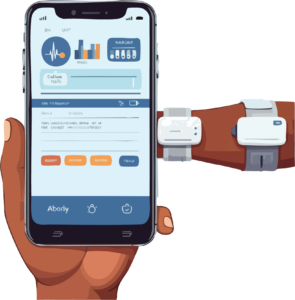
The Beta-cell Evaluation Through data-driven Assessments (BETA) Study
Type 2 diabetes (T2D) is caused by a combination of insulin resistance and the gradual decline of beta-cell function. Beta-cells in the pancreas are responsible for producing insulin, a hormone that regulates blood sugar levels.
Currently, it is difficult to measure beta-cell function accurately without invasive tests. The Beta-cell Evaluation Through data-driven Assessments (BETA) Study aims to develop a non-invasive method for assessing beta-cell function using continuous glucose monitoring (CGM) data and information gathered from wearable devices and a smartphone app.
We will recruit 160 adults with Type 1 diabetes, T2D, or prediabetes to participate in this study. Participants will wear a CGM and a smartwatch and perform specific "challenges" at home, such as consuming high-sugar or high-fat meals.
Scientific Goals
- Develop a non-invasive method for assessing beta-cell function that will allow for improved management and tailored treatment of T2D and prediabetes.
Anticipated Deliverables
- A prototype app that can distinguish between high and low beta-cell function using CGM data and a series of simple tasks.
- A better understanding of the role of beta-cell function in the progression of T2D.
- Improved methods for early detection and personalized treatment of beta-cell changes in T2D.
By comparing the CGM data from these challenges to a traditional "ground truth" measure of beta-cell function (a Minimal Model Oral Glucose Tolerance Test), we aim to develop an algorithm that can assess beta-cell function without invasive testing.
Our ultimate goal is to develop a prototype app that can distinguish between high and low beta-cell function using CGM data and a series of simple tasks. This tool would be essential for better management and understanding of T2D.
Recruiting at the Buck's Clinical Research Unit
The Buck Institute's Clinical Research Unit (CRU) and 4YouandMe, a non-profit organization with extensive experience in participant-centric digital health research studies, will conduct the BETA Study.
- Recruitment: The Buck CRU will leverage its existing community engagement programs and networks to recruit participants. 4YouandMe will assist with targeted recruitment strategies, particularly for underrepresented populations, using their expertise in social media outreach.
- Screening and Baseline Assessments: The Buck CRU will conduct in-person screening visits, including medical history reviews, anthropometric measurements, and questionnaires and will perform the Oral Glucose Tolerance Tests (OGTTs) for the ground-truth assessment of beta cell function. 4YouandMe will provide support for digital health technology (DHT) onboarding.
- Study Devices and Data Collection: 4YouandMe will provide expertise on the use and integration of various DHTs, such as wearable devices and smartphone apps, ensuring data quality and participant compliance.
- Participant Engagement and Support: 4YouandMe will implement its proven engagement strategies, including bi-weekly phone check-ins with participants, to maintain motivation, address technical issues, and collect feedback. 4YouanMe will also administer and oversee the home-based “challenges” during the study. The Buck CRU will provide clinical support and oversight throughout the study.
This collaboration between the Buck CRU and 4YouandMe will ensure the successful implementation of the study, combining the Buck CRU's clinical expertise with 4YouandMe's experience in participant engagement and digital health technologies.
Leadership

Stephen Friend, MD, PhD
Cofounder & President, 4YouandMe

Jennifer Lovejoy, PhD
Chief Translational Science Officer, Phenome Health


